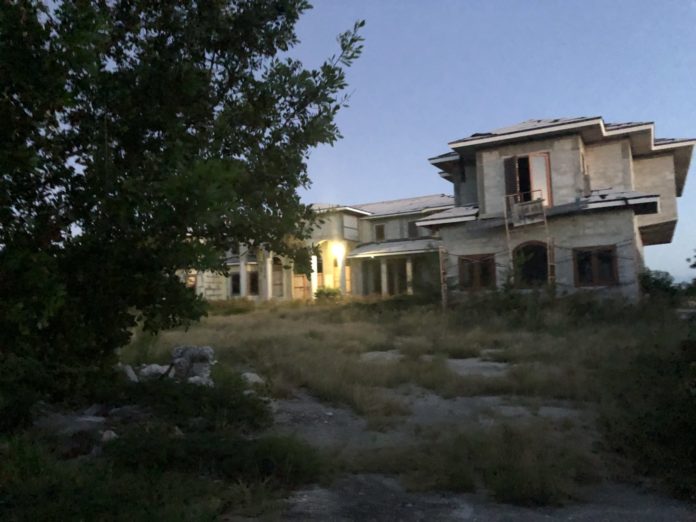
There’s an unfinished home on the end of Coco Plum Drive that is something of a mystery. It’s huge by any standard … but has never been finished. Clearly, money has been invested in this venture that has never been completed. In fact, the first building permits were issued in 2008.
Marathon Councilman Dan Zieg, a neighbor, said it’s an eyesore.
“This is absurd,” he said. “Even after just two years, they should have a very good reason for not finishing the building.”
There are bullet holes in some of the windows; others hang open, exposing the interior to the elements. The safety fence and attached “No Trespassing” sign have fallen down. Rusted and rickety scaffolding is collapsing. The specter is lit by a single bulb in the two-story grand entrance of the 15,000-square-foot home.
At the moment, the issue seems to be at a standstill. The last communication between a representative of the homeowner and the City of Marathon took place a month ago. That’s after the representative, Wayne Gwilliam of MCF Construction in Tavernier, attempted to retrieve the latest round of permits nine months after they were issued in January 2019.
According to a city ordinance, permits that have been issued — but not paid or retrieved — expire in 60 days.
“Neither the homeowner nor contractor for the Coco Plum property had picked up the permits. So they were canceled. That’s the building code rule,” said Doug Lewis, the city’s director of growth management.
So then the contactor asked for another extension, Lewis said. And so, Lewis replied in a Sept. 30 email with a firm stance. The contractor and homeowner would need to do five things: provide an executed contract between the contractor and the owner that laid out terms for an escrow account with the funds necessary to finish the project; a timeline acceptable to all three parties; a performance bond in favor of the city for $200,000; the jobsite cleaned and secured before permits are issued; and promises the jobsite would be maintained during construction.
That $200,000? That’s how much the city thinks it would cost if the house had to be demolished and carted away.
The city may have reason to be skeptical. This saga has been going on 11 years, or 15 if the count begins on the day the homeowner first applied for the building right. The original permit has had six extensions and one reinstatement. It expired mid-2016. Halfway through this process, the homeowner applied for a permit to build a guest house. The building right wasn’t granted until 2015 and received one extension. It, too, expired. And then, in 2019, the permits were re-issued … but not until after a protracted battle on the cost of the permits, Lewis said. Ultimately, the city gave the homeowner “credit” — subtracting the total sum of previous permits from the cost of the new 2019 permit.
In between all the work in the planning department, the code violations were stacking up — more fill was trucked in than agreed upon, the work site was a messy danger, roof tiles were stacked on the roof for two years without being installed, and at one point workers started construction even though the permit had expired.
Councilman Zieg said even if the permitting is resolved, the structure might still be unsafe.
“The roof trusses have been sitting exposed to the elements for years. The same for the unfinished concrete,” he said. “And the hurricane rating for roofs has increased to 185 mph since the first permit was issued.”
According to the Monroe County Property Appraiser, the unfinished house and property are assessed at $245,000 and it has a market value of $1.6 million.
There’s one more mystery. Who is Carlos Pereira of Wilmington, Massachusetts?























